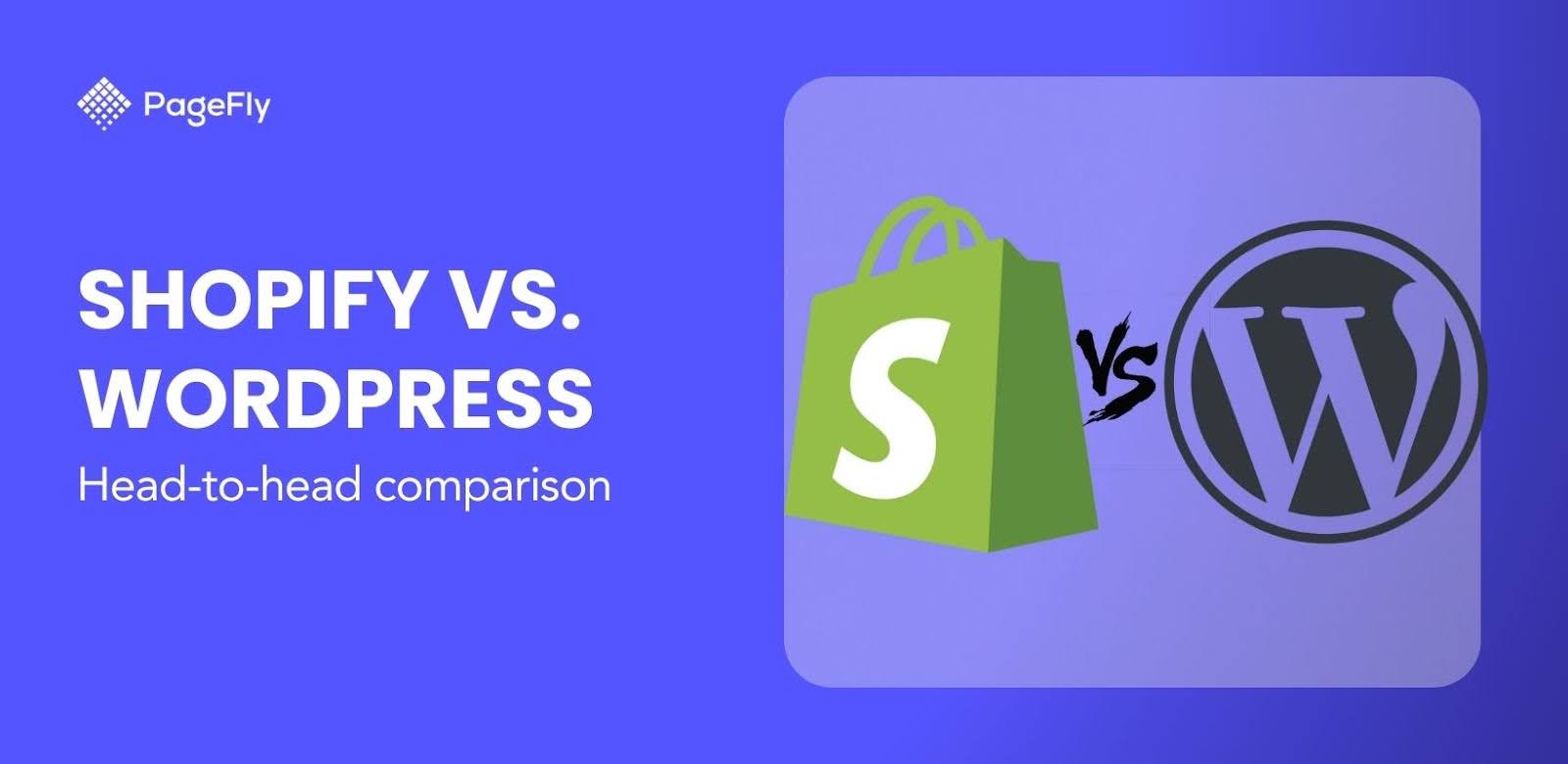Choosing a platform for a website is not easy. Especially when there are a lot of options to choose from. But in terms of ecommerce, WordPress vs. Shopify is a question that we often hear. So to finally settle this discussion, we will put these platforms in a head-to-head comparison to help you decide.
After reading this, you will no longer be confused when choosing either Shopify or WordPress for your ecommerce business.
In this article, we will have a head-to-head comparison of Shopify vs WordPress through the 2 following parts:
- An overall comparison of WordPress vs Shopify
- Unbiased reviews of Shopify vs WordPress
Let’s dive right in!
WordPress vs Shopify: An Overall Comparison
Before having detailed comparisons of WordPress vs Shopify, let’s take a look at an overview of these platforms, as well as their pros and cons below.
What is WordPress?
WordPress is an open-source CMS, which is the first blogging platform in the world. Thanks to recent code-relating changes, it has become a leading eCommerce solution with a massive ecosystem of plugins.
Currently, you can reach WordPress with 2 main versions: WordPress.org (self-hosted) and WordPress.com (hosting service).

WordPress is the most common worldwide CMS
Pros | Cons |
|
|
What is Shopify?
Shopify is a hosted eCommerce solution offering you powerful functions to run an online store effectively.
Currently, Shopify is home to around 4.5 million live worldwide websites, with a wide collection of famous brands like NetFlix Shop and Gymshark. Besides that, you can consider the Shopify Plus plan to scale up your store effectively.

Shopify is outstanding with various built-in eCommerce features
When you sign up for a Shopify account, you only need to pay $1/month in the 3 first months to experience everything on Shopify. This can not only help you save your budget but also easily have general evaluations about how it works. After that, you'll need to choose a Shopify plan to keep using Shopify.
Pros | Cons |
|
|
Shopify Vs. WordPress For Ecommerce: Let’s Figure It Out
With our Shopify or WordPress introduction above, we believe that you have basic knowledge of both. Generally, while WordPress focuses on website content promotion, Shopify is encouraged to develop an eCommerce-tailored platform.
Now, let’s compare these two popular platforms under 11 crucial criteria.
#1. Ease of use
First and foremost in our WordPress Shopify comparison is the ease of use.
It’s recommended to take some technical skills to optimize your WordPress site’s performance. Besides that, you need to set up, maintain, and update your platform on your own.
This might be a challenge with users who are not familiar with website structure. However, the WordPress dashboard is highly evaluated thanks to a well-structured layout once you get a hang of it.

WordPress dashboard is well-structured with clear sections
For beginners, Shopify is an ideal solution thanks to its wonderful ease of use. Like WordPress.com, Shopify offers a user-friendly dashboard to configure your store’s settings effectively. Besides that, you can test how Shopify works with a trial version without paying any fee.

Shopify interface dashboard is intuitive to experience
Verdict: Shopify wins When comparing Shopify vs WordPress in this aspect, the former is a winner because it is easier to use and requires little to no technical skills. |
#2. Level of customization
Another important concern when comparing Shopify vs. WordPress for ecommerce is the level of customization.
With WordPress, you can get more opportunities to modify your site’s structure, but it requires a higher level of coding knowledge. All things you need to do is learn how to use the HTML source, or else let’s have WordPress experts help you!
By contrast, Shopify is famous for its intuitive interface, which makes it perfect for users who prioritize a quick setup. Also, you can modify the source code with Liquid coding language to change the Shopify layouts on a certain level. Indeed, Liquid might be easier to customize compared to HTML.

Liquid language is a special language to edit code in Shopify
Verdict: WordPress slightly wins From our experience, WordPress can offer you more extensive customizations than Shopify, provided you have some technical skills. |
#3. Pricing plans
The third aspect to evaluate is WordPress vs Shopify pricing packages, which have a strong impact on the final decision of e-merchants.
When it comes to WordPress, let’s take a look at the difference between WordPress.org and WordPress.com pricing packages. In particular:
WordPress.org | WordPress.com | |
Requirements | Users pay for all the associated costs: domain names, hostings, security, plugins, and development. | WordPress team takes care of everything on the site. |
Pricing ranges | Free | Starts at $9 per month. Free plan available |
Regarding Shopify, you can consider one of the 3 following pricing plans:
- Basic Shopify: $39/month
- Shopify: $105/month
- Advanced Shopify: $399/month
To maintain your Shopify running well, you need to pay for a domain, starting from $14/year. Plus, Shopify will charge you additional fees from 0.5% to 2% for each order, which depends on which plan you select.
If you want to learn more about estimating Shopify costs, let’s refer to our Shopify pricing calculator for detailed instructions.
Verdict: It’s a tie From our expertise, it’s hard to conclude whether WordPress or Shopify is a better option in this concern. Nevertheless, if you prefer more eCommerce functions and sell products immediately, taking Shopify pricing plans will be an ideal solution. |
#4. eCommerce features
If you own a powerful WordPress site, don’t miss the WooCommerce plugin to gain eCommerce values for your business. With this plugin, you can reach most of the essential features to establish an eCommerce site, like dropshipping, shipping methods, payment gateways, and so forth.

WooCommerce is the leading eCommerce plugin in WordPress
On the contrary, Shopify doesn’t require you to use any additional app to start your eCommerce business. All things you need to do is use built-in eCommerce tools from the Shopify dashboard. This somewhat helps you save effort and budget effectively.
Verdict: Shopify persuasively wins In this WordPress Shopify comparison, the latter is a better option thanks to its strong built-in eCommerce features. |
#5. Multi-commerce features
In this regard, Shopify vs. WordPress can satisfy your demands with the 2 basic functions, including:
- The ability to list products to social commerces/marketplaces
- Support selling in person (POS)
However, to get these features on WordPress, always activate the WooCommerce plugin in your WordPress admin first.
Regarding POS, Shopify seems easier to experience thanks to its specific POS system called Shopify POS. This can make your customers’ experience more seamless than completing transactions through a third party integrated with WooCommerce. Similarly, in case you want to sell products with multi-channels, Shopify is still a better solution.
Don’t forget to refer to Shopify POS pricing for more information.

Shopify provides 2 POS pricing plans
When you want to sell products beyond your current site, it’s easier with Shopify. With Shopify, you can directly connect your shop to Instagram, Facebook, Handshake, TikTok, Etsy, etc. By contrast, if you are running a WordPress site, it’s necessary to add an eCommerce plugin (e.g. WooCommerce) first to start your business with multi-channels.
Verdict: Shopify convincingly wins With multi-commerce features, we are greatly impressed with Shopify, especially the powerful tool called Shopify POS. |
If you want to adopt Shopify’s multi-commerce features to your WordPress store’s database, let’s have a Shopify migration immediately. Transferring your store can be difficult and may result in unexpected technical errors. In this case, let’s try WordPress to Shopify migration with LitExtension. Being one of the leading and long-term Shopify partners, LitExtension can provide various services relating to transferring store databases and updating post-migration activities. With more than 10 experience years, LitExtension can help you attain your migration with the finest results and a high level of security. |
#6. Themes
In comparing WordPress vs Shopify for eCommerce concerns, don’t forget to look at their themes. This is especially important to impress your visitors, which is beneficial to enhance the conversion rate.
WordPress can deliver both paid and free templates with various topics. Whether you use WordPress.com or WordPress.org, you can completely have proper customization options to make your storefront more visual. As mentioned above, don’t forget to combine your HTML skills to optimize that.

WordPress provides both paid and free themes to experience
On the other hand, you can reach over 180 responsive Shopify themes to help your site be outstanding. You can also build a custom Shopify theme on your own only with several drag-and-drops. And the best part is that you can extend your Shopify theme's features and enhance its visual elements with lots of powerful page builders, including PageFly.

Shopify delivers fully responsive and outstanding themes
Verdict: It’s a tie Shopify and WordPress can deliver a wide collection of eCommerce templates; thus, it is not easy to pick a winner of both in this area. |
#7. SEO features
The next comparison aspect relates to Shopify vs. WordPress SEO and marketing, which is integral to enhancing your site’s rankings on search engines.
Since WordPress is a blog-focusing platform, SEO is one of the most notable sides that you can not miss in this comparison. With WordPress, users will have a chance to reach Jetpack Essentials, which delivers powerful SEO tools for SEO value promotion. Also, don’t forget to use additional marketing plugins to optimize your marketing plans effectively.

WordPress is effective in enhancing SEO with powerful marketing plugins
You can do everything to boost your site’s SEO results on Shopify, like modifying the URLs, meta titles, and descriptions or adding 301 directs. However, you find it difficult to have advanced customizations or edit Robots.txt files, which are considered the biggest Shopify SEO drawbacks that any merchant can not ignore.

Shopify marketing app
Besides that, Shopify also provides a wide collection of add-ons and apps to make your site more friendly to search engines. Some outstanding options can be listed, such as SEO Doctor, SEO Booster, and Smart SEO.
Verdict: WordPress convincingly wins In our opinion, WordPress does better at SEO and marketing concerns when compared to Shopify. |
#8. Plugins and apps
Basically, you can use up to 50,000+ WordPress plugins to optimize your site performance. However, remember that you need to pay from $25 to $45/month to experience this benefit on WordPress.com. With WordPress.org, you can freely add or customize any plugin’s structure if you want.

WordPress is outstanding with a wide collection of 50,000+ plugins
With Shopify, you can add third-party apps or your own extensions for excellent integrations. In the Shopify App Store, users will find over 8,000 apps, including free and paid. Normally, these plugins can cost you from $15 to $50 monthly to maintain their operations on your site.

Shopify App Store is built with thousands of powerful apps
Verdict: WordPress persuasively wins Undoubtedly, WordPress exceeds Shopify regarding the number of plugins, which is more flexible for your store’s integration. |
#9. Payment gateways
Indeed, WordPress doesn’t accept online payments by default. However, you can take the support of WooCommerce to access 40+ payment gateways with the leading worldwide gateways like Stripe, PayPal, or Google Pay.

Leading payment gateways are used on WordPress
On the other hand, Shopify can easily integrate with 100+ external payment providers, giving you more options to set up in this regard. Additionally, you can use Shopify Payments to reduce several additional charges for each order.

Shopify offers both Shopify Payments and external payment gateways
Verdict: Shopify wins In this WordPress Shopify comparison, Shopify clearly offers you more payment gateways to benefit your customers’ transaction process. |
#10. Security
Regarding WordPress vs Shopify security, both platforms provide free SSL certificates - one of the leading tools to ensure security for online communications. However, while Shopify offers SSL out of the box, WordPress requires you to set up and maintain security on your own. This can take you time and effort to run with WordPress.
Being a web-based solution, Shopify comes up with the best security performance. This platform frequently has technical upgrades to remove unexpected pitfalls. Besides that, you can directly contact the professional team for urgent security issues. That’s why we always highly evaluate Shopify in this concern.
Verdict: Shopify slightly wins When mentioning security problems, we consider that Shopify is a winner thanks to its regular upgrades and professional technical team. |
#11. Customer support
Customer service is the next part to consider in the Shopify or WordPress comparison. From our experience, only when registering for the paid WordPress plans can you get the perfect support from the Shopify experts. Nevertheless, you can read available documentation on WordPress Support for useful tips.
By contrast, Shopify always makes its users satisfied with excellent customer service. With 24/7 support, you can easily ask the Shopify team for questions any time you want. Plus, you can learn how to fix your issue with Shopify tutorial videos, webinars, or a community for in-depth knowledge.

Shopify tutorial videos instructed users with useful tips
Verdict: Shopify convincingly wins It is apparent that Shopify is much more impressive than WordPress in customer support for both the flexibility of time and methods. |
Shopify Or WordPress? Our Final Verdict
With our in-depth comparison of Shopify vs. WordPress for ecommerce, we believe that you have clear evaluations of both platforms. From our expertise, WordPress is the best CMS to build your content-rich website, but requires several technical skills to get the finest results.
By contrast, Shopify delivers a broad range of strong eCommerce features to boost your business sales effectively. Besides that, you can access a user-friendly interface dashboard, which is great to have flexible customizations for your site.
In case you want to switch your current site to Shopify for outstanding eCommerce features, let’s consider Shopify migration services to save efforts.
WordPress vs Shopify: FAQs
Is WordPress better than Shopify?
The answer depends on your specific requirements. If you want to increase your store’s sales, Shopify might be a better solution. By contrast, WordPress helps you develop a rich-content website effectively.
Is Shopify better than WordPress for online stores?
Yes. With unique eCommerce features, Shopify can exceed WordPress in selling online. Besides that, while WordPress requires an additional plugin to start your business, Shopify allows you to sell immediately. This is great to save time for the first setups in your online store.
Can you sell on WordPress with Shopify?
Definitely yes. To sell on WordPress with Shopify, you need to add a Shopify Buy Button to your WordPress website. In this way, you can take advantage of both platforms to boost your store’s performance better.
Is Shopify better than WordPress for affiliate marketing?
The answer is yes. Indeed, it is easier for you to promote any affiliate marketing approach on Shopify instead of WordPress. You can try outstanding apps like Affiliate Marketing & Tracking or GoAffPro to get the finest results on your Shopify store.
Conclusion
Our blog has just provided a head-to-head comparison of WordPress vs Shopify. Basically, if you focus on developing an eCommerce-tailored site, WordPress simply doesn’t satisfy your demands. Instead, let’s run your plan with Shopify for a wide range of powerful eCommerce features. Whichever option you get, don’t forget to consider all pricing plans carefully to have the best preparations for your budget.
Explore more, check out: A to Z Guide On How To Migrate From WooCommerce To Shopify









![14 Profitable Small Food Business Ideas for 2025 [Real Numbers]](http://pagefly.io/cdn/shop/articles/1_58b587d2-13db-4aa6-8c19-e40f5c88d3eb.jpg?v=1758255771&width=4460)
![Art Business Names: 350+ Ideas + Free Generator [2025 Updated]](http://pagefly.io/cdn/shop/articles/art_business_name_e94a54e9-d325-4ba3-94ab-7b4297952312.png?v=1760062968&width=1640)







